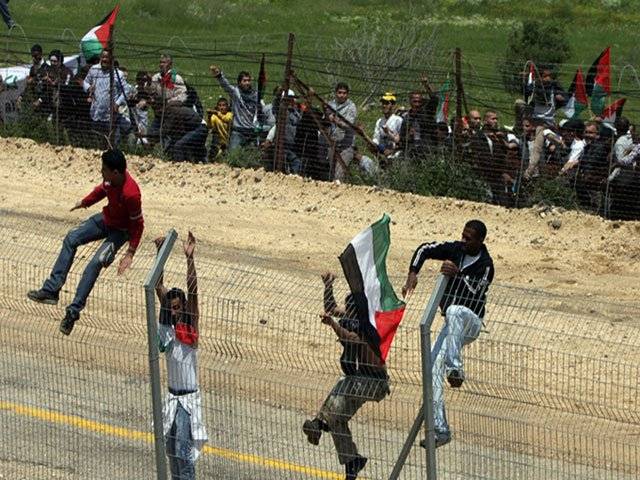Myths perpetuated by Israel as to why the right of return is impossible are easily debunked when looked at logically. After years of marginalisation in the peace process, the Palestinian refugees are back on centre stage. On May 15, Nakba day, the refugees forced their way on to the news agenda; in the past two weeks, Israeli and Palestinian leaders have been compelled to comment on what has always been so much more than a final status issue. During his remarks in the Oval Office, and in response to an op-ed in The New York Times by Mahmoud Abbas, Israeli PM Netanyahu dismissed the refugees right of return as fatal to Israels future as a Jewish state. But the permanent expulsion of one people to make way for another is a hard sell, which is why Netanyahu and others rely on oft-repeated myths about the refugees. One myth is that the creation of the Palestinian refugee problem (a euphemism for ethnic cleansing) was a consequence of the Arab countries war with Israel. This claim was undermined - almost despite himself - by Israeli historian Benny Morris, who though joining the attack on Abbas op-ed, noted that 300,000 Palestinians had lost their homes before 15 May 1948. In fact, as serious historians and research have shown, Palestinians left their homes and villages through a combination of attacks, direct forced removals, and fear of atrocities. The expulsion of the refugees was ultimately realised by the forcible prevention of their return, the destruction of villages, and the legislative steps taken to expropriate their land and deny them citizenship. A second myth manipulates the question of the Jews from Arab countries, around 850,000 of whom left between 1948 and the 1970s. Israels apologists try and suggest that these Jewish refugees somehow cancel out the Palestinian refugees, as if the residents of Ramla or Deir Yassin were responsible for events in Baghdad and Cairo. More than a hint here of all Arabs are the same. In fact, most scorn the link, such as Israeli professor Yehouda Shenhav who wrote that any reasonable person must acknowledge the analogy to be unfounded. When the US house of representatives in 2008 called for linking the issues of Jews from Arab countries and Palestinian refugees, The Economistwrote that the resolution showed the power of the pro-Israel lobby in Washington. Put simply, one right does not cancel out another. Ask those pushing this propaganda if they support restitution and redress for all refugees, Jewish and Palestinian, and they fall strangely silent. But it is the exposure of a third myth that is the most explosive: that a literal return is unfeasible. In the words of the excellent arenaofspeculation.org, engaging in new ways with the spatial, political and social landscapes of Israel-Palestine means that instead of asking can we return? or when will we return? Palestinians are suddenly allowed to ask what kind of return do we want to create for ourselves? A discussion on what implementing the right of the return would look like is taking place. There is the long-standing work ofSalman Abu Sitta and the Palestinian Return Centre (PRC), as well as studies by Badil andDecolonising Architecture Art Residency. Recently, the Israeli group Zochrot published in their journal Sedek a fascinatingcollection of articles on realising the return. Many people are familiar with the words of Israeli military chief of staff Moshe Dayan at a funeral in 1956, when he reminded those present that Palestinian refugees in Gaza had been watching the transformation of the lands and the villages, where they and their fathers dwelt, into our estate. Less well known are the thoughts of his father, member of Knesset Shmuel Dayan, who in 1950 admitted: Maybe [not allowing the refugees back] is not right and not moral, but if we become just and moral, I do not know where we will end up. There can be no doubt that the obstacle to a resolution of this central injustice is the insistence on maintaining a regime of ethno-religious privilege and exclusion. After 63 years of dispossession, the refugees have been once again revealed to be at the heart of the issue, for it is they who best exemplify what it means to create and maintain a Jewish state at the expense of the indigenous Palestinians. Ben White is a freelance journalist and writer, specialising in Palestine and Israel. Al-Jazeera
Tuesday, April 16, 2024
Turning 'right of return into reality

Decision to retaliate against Iran attacks rests with Israel, says Pentagon
1:05 PM | April 16, 2024
Global brands facing challenge from local contenders in Pakistan's FMCG market
10:24 AM | April 16, 2024
Israeli Air Force finalizes preparations for possible attack on Iran
8:21 AM | April 16, 2024
Court remands XEN in FIA custody
April 16, 2024
Political Reconciliation
April 16, 2024
Pricing Pressures
April 16, 2024
Western Hypocrisy
April 16, 2024
Policing Reforms
April 15, 2024
Storm Safety
April 15, 2024
Democratic harmony
April 16, 2024
Digital dilemma
April 16, 2024
Classroom crisis
April 16, 2024
Bridging gaps
April 16, 2024
Suicide awareness
April 15, 2024
ePaper - Nawaiwaqt
Advertisement
Nawaiwaqt Group | Copyright © 2024





